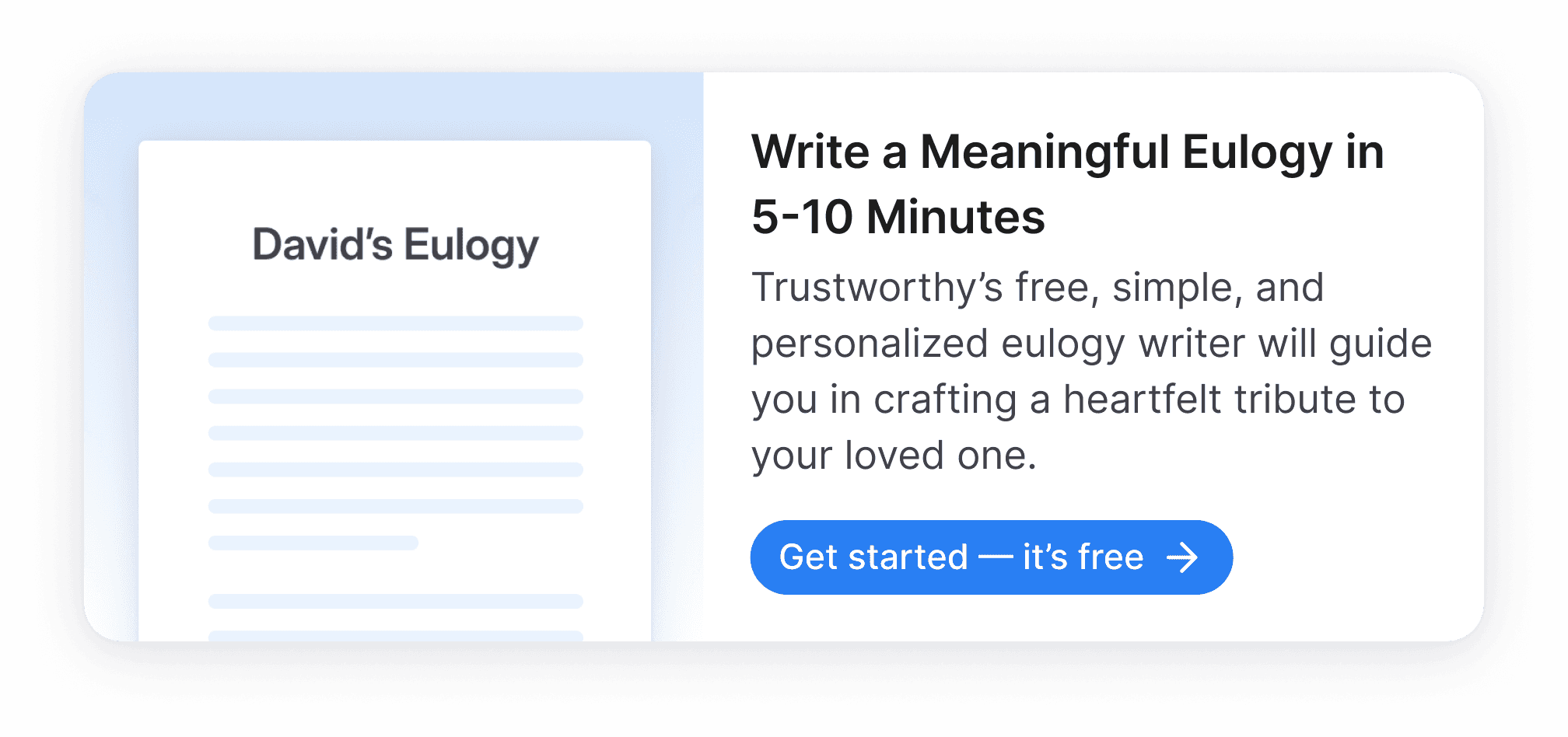Writing a eulogy can be a daunting experience, especially as you’re grieving the loss of a loved one. Many people find starting the eulogy is the hardest part of writing it because you want to create something meaningful but also correct.
To help you write the perfect beginning to a eulogy, we put together some tips on where to start, plus a list of 15 heartfelt examples.
Key Takeaways
A good way to start a eulogy is with a simple introduction of yourself and to thank the audience for coming to the service.
You can add certain things to your eulogy, like quotes, poems, and fond memories.
Avoid talking about yourself for too long in the eulogy, talking too fast, or using superlong quotes in your eulogy.
How to Get Started
Being chosen to write a eulogy for a loved one is an honor, which means you want to write it in the best way to pay tribute to the deceased. Here are some tips on how to begin.
Introduce Yourself
At the start of a eulogy, one of the first things you should include is who you are. Introduce yourself and explain your relationship to the deceased. This helps listeners feel more connected to you.
If you aren’t a family member, you can also offer your condolences to the deceased’s loved ones.
Thank People for Coming
Thank the audience for coming to the funeral, memorial, or whatever type of service you are having. This makes them feel appreciated and starts the service off the right way.
If there are any people who brought food, were part of the planning, or deserve a special mention, you can thank them as well.
Talk More About Your Ties to the Deceased
After introducing yourself, you can lead into talking about the relationship you had with the deceased. Examples: things they taught you, something special you will remember them for, or the effect they had on your life.
Share a Quote or Poem
Some people like to start the eulogy with a quote or poem they feel is appropriate for the service. It sets the tone for the rest of the speech.
If your loved one had a special saying that people associated with them, it’s appropriate to use it at the start of the eulogy.
Share a Fond Memory
There is no right or wrong way to begin a eulogy, and you can always share a fond memory of the deceased. Sharing memories can evoke feelings of nostalgia and positivity toward the person who passed. Remember, the eulogy is a celebration, a tribute to the deceased.
Darcey Peterson, a professional eulogy writer in Washington state, advises: “For a simple example, ‘Aunt Jane was kind and she loved animals.’ Consider instead a memory like, ‘I still remember summer vacations and overnights with Aunt Jane. I always loved helping her with her evening ritual of feeding the dogs and the birds and even the stray neighborhood cats; all before we even sat down for our own dinner!’”
Tell a Story
You can begin the eulogy by sharing a short story after your opening lines. This is a great way to engage the audience and build a connection with them.
Brett Simner, a TedX speaker and teacher at the Swiss International School, suggests: “Tell stories, great stories, the ones that some will know, but not everybody. They can, of course, include professional accomplishments, but they can also be funny or quirky.”
15 Examples of Eulogy Introductions

Starting a Eulogy for a Parent
Example 1: Good afternoon. Thank you all for coming. Before I begin, I wanted to read a meaningful poem that reminded me of my mother, [deceased’s name].
Example 2: Dear friends, family, and colleagues of [deceased’s name], I am [your name], and it is my honor to reflect on the life of my father, [deceased’s name], today. I’d like to take a moment to share my fondest memory of him.
Example 3: For those of you who don’t know me, I am [deceased’s name’s] daughter. My mother always used to say [insert funny saying], and if she were here with us today, I have no doubt she would think so, too.
Starting a Eulogy for a Partner
Example 4: [Partner’s name] was my Prince Charming and the man that I loved from the moment I saw him. I remember that day so clearly [insert memory of how you met the deceased.] [Partner’s name] always wore a smile, and if you were having a bad day, he would always try to cheer you up.
Example 5: [Partner’s name] once said, [add saying], and I feel like she was speaking about us as a couple. [Partner’s name] was someone I knew I would spend the rest of my life with. [Share memories.]

Example 6: Every love story is beautiful, but ours was my favorite. As [deceased's name’s] partner in life and adventures, I am deeply honored to stand here before you today, not to mourn his passing, but to celebrate the vibrant and inspiring life he led.
Starting a Eulogy for a Friend
Example 7: [Deceased’s name] was my best friend on and off the basketball court, and I’ll miss all the afternoons we spent playing together. [Share memories.]
Example 8: Good afternoon, my name is [your name], and [deceased’s name] was my friend. I have known [deceased’s name] since we were young children, and I will always remember the time that we [share memory of the deceased].
Example 9: Good day, friends and family. I just want to start by thanking you all for coming out this afternoon to celebrate the man we all loved, [deceased’s name], and his family. I know many of you traveled from far to be here with us, and I’m very grateful for that.
Starting a Eulogy for a Child
Example 10: Good day. Thank you all for coming. I know that [child’s name] would be so touched to see you all here honoring her life. [Child’s name] always loved it when the family got together, especially at Christmas. [Share memory.]
Example 11: Dear friends and family. I wanted to start with a quote I know [child’s name] would like by Thomas Jefferson: [quote]. [Child’s name] always enjoyed learning about history, and we often visited the local museum. [Share memory.]
Example 12: While the passing of [child’s name] is tragic, it's important to take this moment to celebrate their life and hold our loved ones near. My name is [your name], and [child’s name] was someone who was always cheerful even when things were bad.
Starting a Eulogy for a Sibling
Example 13: Hi, everyone. Most of you know me, and to those who don’t, [sibling’s name] was my sister. Growing up with a sister older than you can be tough, but it also meant that I always had a friend who was there for me. [Share a funny story.]
Example 14: [John 14:27] My sister, [sibling’s name], always loved that Bible verse and would often read it to me during times when I was nervous about something. [Sibling’s name] and I were always close. We would often [share a memory].
Example 15: Dear friends and family, thank you all for being here. [Sibling’s name] was my younger brother and best friend. If [sibling’s name] were here today, I know he would have said, [insert deceased’s favorite saying].
Mistakes to Avoid in the Introduction of Your Eulogy

A eulogy doesn’t have to be perfect, and there are no rules on what to include. It’s all personal. However, there are some mistakes that you should avoid making in the introduction.
Speaking Too Fast
Speaking in front of a bunch of people can be nerve-wracking, especially when you’re talking about something so personal and emotional. However, you should avoid speaking too fast, as some people may struggle to understand you, and the eulogy will feel rushed.
Using Long Quotations or Religious Passages
Beginning the eulogy with a long quotation or religious passage can make it feel impersonal. Long passages can cause the audience to become distracted or lose interest, as they cannot relate to you and the eulogy.
Giving Too Much Detail About the Death
Avoid oversharing too many personal details about the deceased’s passing, their life, and their family. This may cause feelings of embarrassment, especially if the death was a controversial one, like an overdose of drugs. If you’re unsure whether to include something, ask your friends and family first.
Making Unnecessary Jokes
It’s OK to keep things upbeat and lighthearted when starting your eulogy. You can even make a joke or two. However, you should avoid unnecessary humor that can come across as offensive and tasteless.
Related: Can a Eulogy Be Funny
Telling Embarrassing Stories About the Deceased
You are welcome to share any fond or (appropriate) funny memories you have of the deceased, but this doesn’t mean you should share embarrassing stories. This can come across as disrespectful and hurt the family’s feelings.
Bringing Up Grudges
When writing the introduction of the eulogy, you should not bring up any grudges you have between the deceased and their family. Not only is this disrespectful toward the person who passed, but it’s also hurtful to the family.
Examples From Published Eulogies
Examples of good eulogy openings are virtually endless. Here are a couple more for inspiration:
Bill Frezza, a tech-industry veteran, writer and broadcaster, started his eulogy for his father, Robert C. Frezza, this way:
"Summing up my father's life, I keep coming back to one thought. Never will you meet a man who more faithfully lived his values.
"My father was a teacher of all things. His method was simple. He taught by example. At any age, when faced with an ethical dilemma, after reflection, study, or even rationalization, I find myself coming back to one simple question. What would Dad do? His character is the foundation of my conscience."
Here's how Oprah Winfrey began her eulogy for civil-rights activist Rosa Parks:
"I feel it an honor to be here to come and say a final goodbye. I grew up in the South, and Rosa Parks was a hero to me long before I recognized and understood the power and impact that her life embodied. I remember my father telling me about this colored woman who refused to give up her seat.
"And in my child’s mind, I thought, 'She must be really big.' I thought she must be at least a hundred feet tall. I imagined her being stalwart and strong and carrying a shield to hold back the white folks. And then I grew up and had the esteemed honor of meeting her."
We’d love to hear from you! Feel free to email us with any questions, comments, or suggestions for future article topics.
Trustworthy is an online service providing legal forms and information. We are not a law firm and do not provide legal advice.















